By Liz Timbs and Peter Alegi
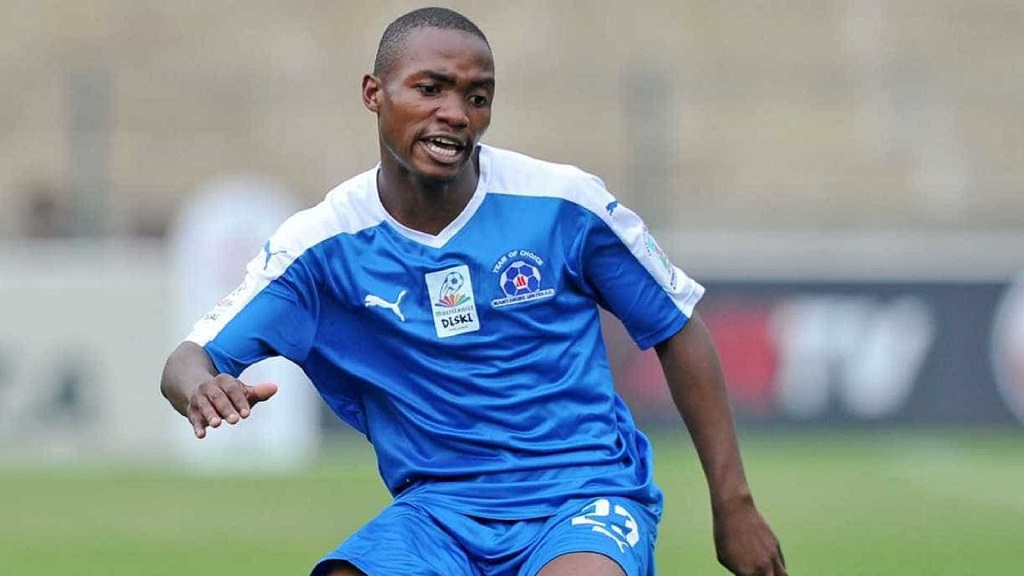
Tragically, on May 4, 2018, 21-year-old striker Luyanda Ntshangase passed away, two months after being struck by lightning during a Maritzburg United friendly. Football Is Coming Home extends our most heartfelt condolences to the Ntshangase family.
The funeral service will take place at Alan Paton Hall, Maritzburg College, Princess Margaret Drive, Thursday, May 10, at 10am.
Listen to Luyanda’s 2016 interview with Liz Timbs, in which he spoke matter-of-factly and powerfully about what mattered to him most in life and football, his hopes and dreams for the future.
At this time of sadness and grief, it is important to hear his passion, focus, and dedication to the game. Not only have Pietermaritzburg and South Africa lost a talented striker, but also a young man of great character and boundless promise.
Hamba kahle, Luyanda!
Tag: Izichwe
Struggle On, Luyanda Ntshangase
On March 1, 2018, 21-year-old Maritzburg United striker Luyanda Ntshangase was struck by lightning during a friendly match. He is in a medically induced coma and remains in critical, but stable condition. Our thoughts and prayers are with Ntshangase and his family in the hope of a speedy and full recovery.
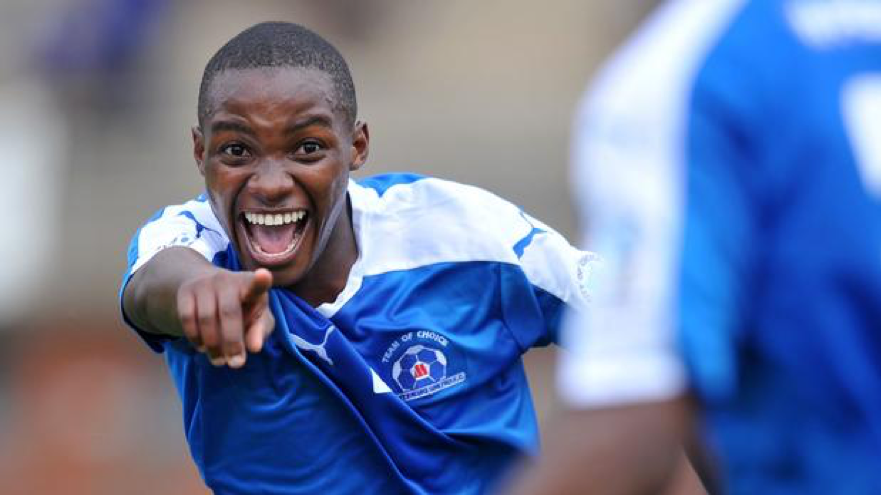
I met Luyanda Ntshangase in 2013 when I began to work with Izichwe Youth Football Club in Pietermaritzburg, South Africa. A self-proclaimed “local boy,” Ntshangase was born on January 25, 1997. He was raised in Imbali (Zone 2), an apartheid-era township outside Pietermaritzburg.
Like many South African boys, he began playing football at age six with his friends in the neighborhood. By age eight, he knew that he wanted to play the game for the rest of his life. His parents supported this dream, driving their son to training sessions, watching games, and providing critical support at home.
He joined Izichwe, named after Shaka Zulu’s regiment, in 2012. Though Ntshangase initially struggled to catch up with the other players who had been with Izichwe since 2010, he quickly adjusted and became a cornerstone of the team. He exemplifies everything that Izichwe stands for: “honesty, integrity, working hard, pushing yourself at all times . . . discipline, hard work.”
When I observed practices, Ntshangase stood out for his extraordinary focus and drive. He pushed himself and, by example, inspired his teammates to strive for their best at every training session. This talent and work ethic afforded Ntshangase the opportunity to train with the KZN Football Academy and play a key role for his team in major youth tournaments such as the Nike Manchester United Premier Cup.
Luyanda also excelled in the classroom. The Izichwe coaches’ insistence on educational success made him “realize there is a lot more to life than just football, you know, there is also school–just getting better that side also.” After matriculating from Maritzburg College, a prestigious boys’ secondary school founded in 1863 that counts Alan Paton among its alumni, Nsthangase recently enrolled for a degree in politics at the University of KwaZulu-Natal.
Balancing these responsibilities was “demanding,” he said, quickly adding that “my school and my football go together . . . There’s life after football, you know?” With a maturity well beyond his 21 years, he recognized that “to move anywhere further is to keep on working harder and grow as a person and as a footballer also.”
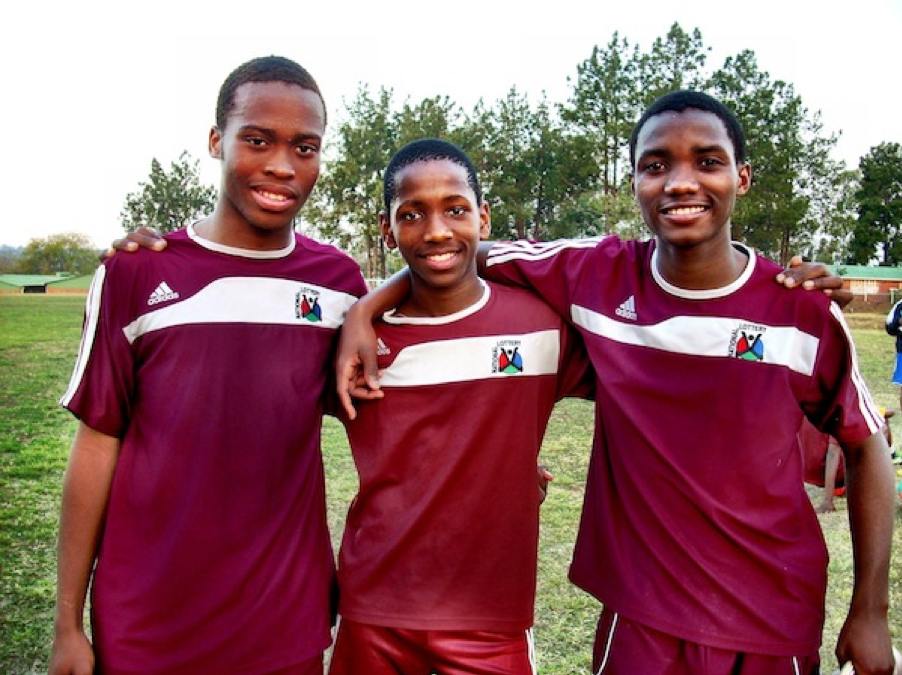
This wisdom and dedication was evident in 2016 when Izichwe played a friendly match against Maritzburg United, the local Premier Soccer League team. Ntshangase impressed head coach Ernst Middendorp, who invited him to train with his team. After a week-long training with the team, Middendorp contacted Thabo Dladla, Ntshangase’s coach at Izichwe, with the news that he wanted to offer the young striker a professional contract.
In February 2017, Ntshangase was selected for South Africa’s Under-20 national team (AmaJita). Upon receiving the news, he told the Maritzburg Fever: “I’m going to take that chance and grab it with both hands and show what I’m capable of and why I was selected. So if that opportunity comes for me–I’ll be very thankful,” he said.
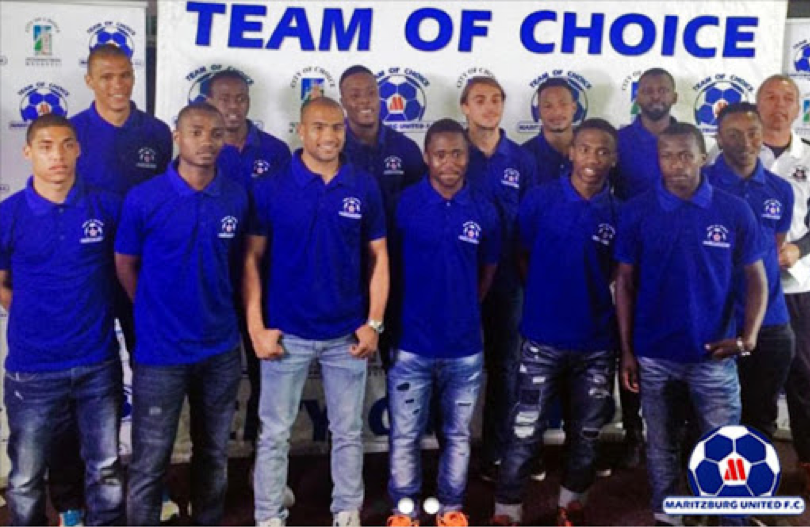
Speaking with Luyanda just a few months into his professional career, he exuded joy and certainty that there was still more to come at Maritzburg United. “[I’m] having [the] time of my life at the moment . . . it’s just the first step for me,” he said.
“I’m looking forward to building on, something bigger, better. It’s something I’ve always dreamed of [. . .]” Ntshangase continued. “I see myself in a few years being somewhere further than where I am now. It could be at another team. It could be at the same place but in a different role . . . but obviously I possibly wish to be at a bigger club or even overseas, you know? That’s where we all dream of going. So if I reach that goal that’s something I’d be very much proud of.”
Update: Tragically, on May 4, 2018, Luyanda passed away. Our heartfelt condolences to the Ntshangase family. May his soul rest in peace. The funeral service will take place at Alan Paton Hall, Maritzburg College, Princess Margaret Drive, Thursday, May 10, 10am.
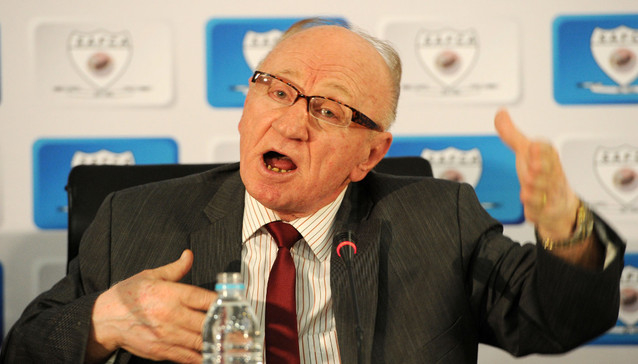
Ted Dumitru, the Romanian-born coach who had a successful career in South Africa, collapsed and died of an apparent heart attack on Thursday at Eastgate Shopping Centre in Johannesburg.
“Throughout our conversations over the years,” recalls Zola Doda in a touching tribute published on Kick Off magazine’s website, “Ted didn’t talk a lot about his country of birth, Romania, which came across as strange to me in the beginning. All he spoke about was South Africa and the African continent as a whole—but over a period time I learned to understand how much he really loved this country and this continent.”
Having coached briefly in the U.S., where he acquired citizenship, Dumitru took the helm of Zambia’s national team in 1981 and later that of Swaziland. He arrived in apartheid South Africa to coach Kaizer Chiefs in 1986, a time of mass protests and army troops deployed in the black townships. Dumitru went on to win four league titles, with Sundowns (1997-98 and 1998-99) and Chiefs (2003-04 and 2004-05), and also had a brief stint as national team coach.
Beyond his clubs’ successes, Dumitru had a major impact on South African coaching education and on youth development. I saw this personally and tracked it over two decades in South Africa and from overseas.
I first met Ted Dumitru in 1995. A friend I had met on the soccer pitch at Wits University took me to the South African Football Association’s first coaching certification course held at the School of Excellence. I was introduced to Dumitru, then the Director of Coaching at SAFA, who was dressed in his typical sweatsuit-and-baseball cap attire. As soon as he learned of my work on the history of football in South Africa, he asked me to return the following morning and give a formal presentation to the coaches. Dumitru believed a country needed to know its football history in order to develop its national identity.
The next day I faced an engaged audience that included Patrick Pule “Ace” Ntsoelengoe, Cedric “Sugar Ray” Xulu, Neil Tovey and many other legendary figures in the South African game. If that context wasn’t intimidating enough, I was also scheduled to follow the charismatic Clive Barker, then-national team coach who, a few months later, would lead Bafana Bafana to their first (and still only) African Nations Cup title.
Dumitru introduced me in a graciously professional and courteous way, which made me feel less intimidated by the moment and helped set the tone for what turned out to be a constructive session and dialogue among the participants.
During that visit, I learned of Dumitru’s background in Romania in the late 1960s and 1970s. I listened to him discuss the emergence of “scientific football” as popularized by Valeriy Lobanowski, the legendary coach of Dynamo Kiev and the USSR. At the time, it was a pioneering approach. It brought together empirical data, computer technology, Soviet collectivist ideology, and Dutch total football. It transformed the way Dumitru conceived, organized, and managed football teams. As Jonathan Wilson succinctly puts it, “football was less about individuals than about coalitions and the connections between them.”
To his credit, Dumitru’s experiences in southern Africa altered his football philosophy and practice to reflect local conditions. Dumitru passionately believed in the technical proficiency, dynamism, and creativity of local players. He spent much of the latter part of his career teaching both young boys and adult coaches how to draw on these strengths while combining them with aspects of scientific football. In the words of Mark Gleeson, Dumitru became “an outspoken proponent of the establishment of a so-called ‘ South African style of play’ with heavy emphasis on individual flair.”
This emphasis was clearly demonstrated before my eyes again in 2010—a magical year for South Africa as it successfully hosted the first World Cup played on African soil. Dumitru came to Pietermaritzburg to help train local coaches and in the process supervised a training session at the Izichwe Youth Football program, where I was involved. His principles were put into action, as he encouraged each and every player to think about space, quick decision-making, smart passing, confidence in dribbling, relationship with teammates, and to be unafraid of expressing joy on the pitch. When one boy scored a mesmerizing goal but did not celebrate, Dumitru encouraged him to do so: “Soccer is supposed to be fun!” he exclaimed.
Dumitru, of course, had his shortcomings. According to Gleeson, he was perceived by many as “dogmatic” and few can forget his public statement that South Africa’s first-round exit from the 2006 African Nations Cup was partly due to the fact that “my players don’t know how to play in the rain.”
Even so, Dumitru should be remembered as an innovative coach who left an important legacy in South Africa. He introduced new ideas from eastern Europe at a time when the country was isolated from international football and when South African coaching was dominated by English-speaking whites. Dumitru stands out as a rare white coach who genuinely believed in decolonizing South African football. To the end, he practiced what he preached. At the time of his passing, Dumitru was in town to give a speech at the South African Football Coaches’ Association Youth Coaching Seminar at Johannesburg Stadium.
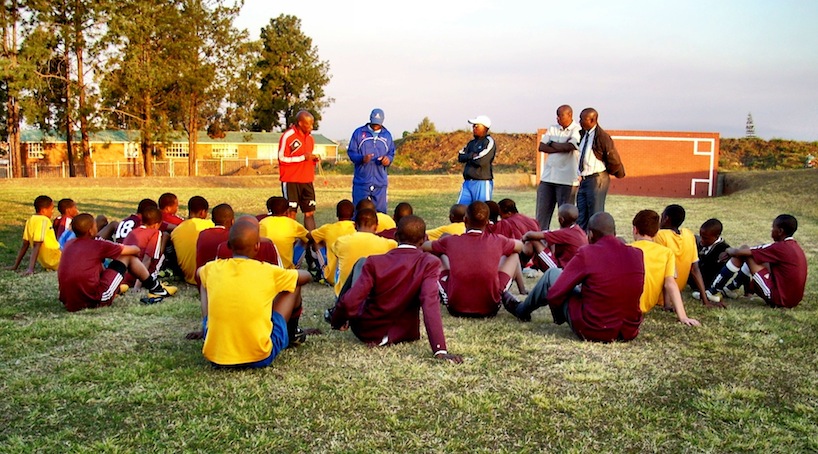
Guest Post by *Liz Timbs
In August 2013, I had the privilege of spending three days with the Izichwe Football Club in Pietermaritzburg, capital of South Africa’s KwaZulu-Natal province. During my brief stay, I observed training sessions, visited players’ high schools, and interviewed some of the young men and coaches. The quotes below come from these conversations.
Every weekday afternoon at the University of KwaZulu-Natal campus in Pietermaritzburg, two dozen 10th grade-boys come together on a humble football pitch to hone their skills at Izichwe Football Club. Established in 2010 and named after the first military regiment (ibutho) commanded by Shaka Zulu, the club is “not just about kicking a ball,” says Thabo Dladla, founding director of Izichwe and Director of Soccer at UKZN. It is also about developing young men of character and respect who represent their communities and themselves with pride and honor.
Respect (inhlonipho in the Zulu language) and discipline (inkuliso) are core values at Izichwe as they are in Zulu culture more broadly. The coaches refer to the teenagers as amadoda (umarried young men) and even baba (father) to stress the importance of carrying themselves in a mature way on and off the pitch.
These two dozen high school boys at Izichwe embody the values and lessons imparted to them by their coaches, especially Thabo’s emphasis on showing self-respect as much as respect for others. When I spoke with the youngsters, they politely thanked me for coming to Pietermaritzburg to meet them and spoke with poise beyond their years.
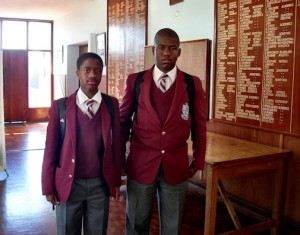 “The program is not only about sports or soccer. It’s mostly about life,” Asanda tells me. Izichwe is “about respecting the people you are around, and playing fair, which applies in life. You do it the right way. Don’t cheat. Don’t cheat yourself.” Similarly, Simphiwe stated, without hesitation, that Izichwe had taught him “to work hard in life and to respect your instructors.” Asanda and Simphiwe’s statements were echoed in a team meeting I observed. Technical director Mhlanga Madondo, a police officer, entreated the players to look at their performances in the previous weekend’s tournament, stating that he expected them to “take responsibility for their own growth.”
“The program is not only about sports or soccer. It’s mostly about life,” Asanda tells me. Izichwe is “about respecting the people you are around, and playing fair, which applies in life. You do it the right way. Don’t cheat. Don’t cheat yourself.” Similarly, Simphiwe stated, without hesitation, that Izichwe had taught him “to work hard in life and to respect your instructors.” Asanda and Simphiwe’s statements were echoed in a team meeting I observed. Technical director Mhlanga Madondo, a police officer, entreated the players to look at their performances in the previous weekend’s tournament, stating that he expected them to “take responsibility for their own growth.”
Hard work is another crucial component of the Izichwe way. When I asked Lindi what the program had given him, he said, simply: “discipline.” Every day, without exception, the boys make their way to the university sports fields to train from 3:30p.m. to 5:30p.m. Many of the boys also play for their school teams at least one day a week (with one boy competing in cross country events in addition to playing school soccer). Saturday is match day in a local amateur league. Sundays are reserved for tournaments. This intense, demanding schedule instills in the boys not only physical endurance and strength, but mental acuity as well. Dladla believes this constant pressure shows the dedication and perseverance of his players. “Boys like Siphesehle (the cross country runner), he’s very, very competitive, you know? He did cross country; he came [to training], and I said, “Hey! You rest!” He said, “No, coach! I came to train!”
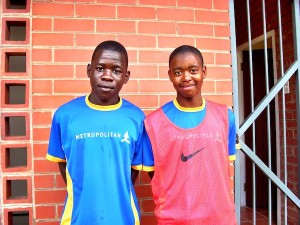 Although the players’ development as athletes is central to the program, Thabo, a former teacher and ex-professional footballer, regularly reminds players that “nothing in this life is as important as knowledge.” As a result, the program integrates numerous educational programs into their activities. Every night at the conclusion of practice, around 5:30, a group of the players gathers in a classroom on campus to study under the supervision of volunteer university students.
Although the players’ development as athletes is central to the program, Thabo, a former teacher and ex-professional footballer, regularly reminds players that “nothing in this life is as important as knowledge.” As a result, the program integrates numerous educational programs into their activities. Every night at the conclusion of practice, around 5:30, a group of the players gathers in a classroom on campus to study under the supervision of volunteer university students.
The coaches closely monitor individuals’ academic performance by reviewing school progress reports. This scrutiny, one parent explained, helps to “notice any hiccups in their progress at school.” In the opinion of Devon, the life sciences teacher at Alexandra High School, which several Izichwe boys attend, such devoted attention to player’s academics is unusual when compared with many other students who lack such careful supervision. “It’s a structured lifestyle which, I think, is lacking in a lot of our schools,” Devon explained. “I think that’s partly why these boys are so successful. They grow and they excel in every area.”
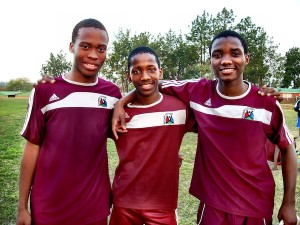 The youngsters openly expressed their gratitude to the adults who put precious time, energy, and resources into the program. “There are many kids out there who want this opportunity and we are very special to get that,” Mpumelelo said. Sandile stated unequivocally that the program has “changed the most part of my life.” Keelyn agreed, and without hesitation added that thanks to Izichwe, “I found myself.” Sandile spoke passionately about his appreciation for Izichwe: “Basically, what this program means to me is that it gives me the opportunity to realize a dream that I never thought . . . it was never something I believed I’d be able to do . . . it just made me realize, if I continue working hard enough, I can be one of the best players in the world.”
The youngsters openly expressed their gratitude to the adults who put precious time, energy, and resources into the program. “There are many kids out there who want this opportunity and we are very special to get that,” Mpumelelo said. Sandile stated unequivocally that the program has “changed the most part of my life.” Keelyn agreed, and without hesitation added that thanks to Izichwe, “I found myself.” Sandile spoke passionately about his appreciation for Izichwe: “Basically, what this program means to me is that it gives me the opportunity to realize a dream that I never thought . . . it was never something I believed I’d be able to do . . . it just made me realize, if I continue working hard enough, I can be one of the best players in the world.”
The Izichwe coaches are also grateful to be part of this project. Coach Madondo said that working with these young men has inspired him; he’s seen them “not just growing physically, but also [in] how to approach life.” Coach Ronnie “Reese” Chetty, who had a long coaching career including experiences in the United States, told me he is reinvigorated by the hard work and dedication these young men exhibit on a daily basis. The coaches are also driven and guided by the hardships, struggles, and perseverance of some of the players and families.
“It’s people like Sipesehle and Mhlengi’s mothers who sometimes give me lots of motivation when I see how hard they try, you know?” explained Thabo Dladla. “So then, I say: ‘Hey man! I cannot give up. I cannot let them down. So let me try and help them develop real men,’ you know?”
And from what I saw these Izichwe boys are becoming real men of immense diligence, humility, discipline, and respect. And, perhaps even more so, this community of boys, men, and parents demonstrates the great potential for grassroots soccer programs to fuel the development of not only athletic talent with a bright future in sport, but also of productive citizens in a democratic society.
—
*Liz Timbs is a PhD student in African history at Michigan State University. Her research interests are in the history of health and healing in South Africa; the professionalization of medicine; masculinity studies; and comparative studies between South Africa and the United States. Follow her on Twitter: @tizlimbs
Banyana Banyana Win Silver: What Next?
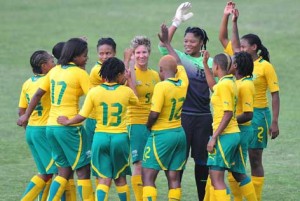 Boosted by a home crowd of 20,000 fans, including President Teodoro Obiang Mbasogo, Equatorial Guinea crushed South Africa 4-0 in the final of the 8th African Women’s Championship in Malabo on Sunday.
Boosted by a home crowd of 20,000 fans, including President Teodoro Obiang Mbasogo, Equatorial Guinea crushed South Africa 4-0 in the final of the 8th African Women’s Championship in Malabo on Sunday.
Banyana Banyana — as the team is affectionately known — held out until the 43rd minute when the home team took the lead through Chinasa’s header from a corner kick. The goal seemed to take the wind out of Banyana’s sails. After the break the qualitative difference between the two sides became evident. Midway through the second half Banyana lost their concentration, giving up three goals in six minutes to the Nzalang Nacional (Nation’s light): Costa (66′), Anonman (70′) and Tiga (72′).
“Falling at the final hurdle is a major disappointment to all involved with Banyana Banyana,” said head coach Joseph Mkhonza at the post-match press conference. In a year that saw South Africa’s women’s team reach two major milestones, competing in the Olympics for the first time and finally beating powerhouse Nigeria, Mkhonza looked ahead and said that “Banyana Banyana should be able to qualify for international tournaments, such as the World Cup and the Olympics, in the future.”
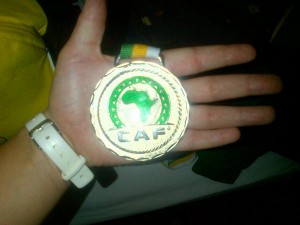 It is always tough to play a final against the host nation, but the big game in hostile territory did appear to get the best of the South Africans. The night before the match, for example, Banyana captain Amanda Dlamini (@Amanda_Dlamini9) shared her state of mind on Twitter. “I don’t know how I’m going to sleep tonight. If I’m going to sleep at all,” she wrote. Then a few hours before the match, defender Janine Van Wyk (@Janinevanwyk5), whose marvelous goal beat Nigeria in Wednesday’s semifinal, tweeted: “Very IMPORTANT game today. I’m so nervous its [sic] insane but I know we will do well.” Perhaps adding to the pressure of the moment, the office of the Presidency (@PresidencyZA) followed by tweeting its support: “President Zuma wishes Banyana well.”
It is always tough to play a final against the host nation, but the big game in hostile territory did appear to get the best of the South Africans. The night before the match, for example, Banyana captain Amanda Dlamini (@Amanda_Dlamini9) shared her state of mind on Twitter. “I don’t know how I’m going to sleep tonight. If I’m going to sleep at all,” she wrote. Then a few hours before the match, defender Janine Van Wyk (@Janinevanwyk5), whose marvelous goal beat Nigeria in Wednesday’s semifinal, tweeted: “Very IMPORTANT game today. I’m so nervous its [sic] insane but I know we will do well.” Perhaps adding to the pressure of the moment, the office of the Presidency (@PresidencyZA) followed by tweeting its support: “President Zuma wishes Banyana well.”
That Banyana could not field three overseas players partly explains Sunday’s result. Midfielder Kylie Ann Louw and reserve goalkeeper Roxanne Barker stayed in the United States due to study commitments, while midfielder Nompumelelo Nyandeni remained with her club in Russia. “Losing a player of Nyandeni’s talent and experience will always be a setback to any team,” said Mkhonza. Another factor to consider has to do with oil-rich Equatorial Guinea’s “willingness to hand out passports to players who agree to play for them without any period of residency,” as Ian Malcolm of goal.com put it. “Almost the entire squad selected for the African Women’s Championship were born outside Equatorial Guinea, most in Brazil, but also in other African states.” While not illegal according to FIFA rules, the ethics of this all-star team formation are questionable.
The buzz about Banyana from South Africans on social media was overwhelmingly positive. “You did South Africa proud, the whole team deserves a heroes welcome. You passed all expectation and showed your greatness,” @RhandzuOptimus wrote in a tweet that captured the general tenor of South Africans’ reactions. The government chimed in too. Sports Minister Fikile Mbalula said that “Although they did not win the (African) Championships, Banyana Banyana have proven that they are an ever improving team that has shown progress over the last year.”
Now that the tournament is over what will happen to the “Banyana Bandwagon”? Practitioners and fans know that women’s football in South Africa needs much more investment and support. Even at the elite level there is no season-long national league. And as Thabo Dladla, founding director of Izichwe Youth Football in Pietermaritzburg, explains in a comment to my previous Banyana post: “There are no competitions for girls junior teams. Our girls only start playing football at the university level. These issues have nothing to do with money. SAFA should play the role in terms of promoting the game.” The road ahead is long and tortuous. We’ll be following developments closely.
Suggested Reading
Prishani Naidoo and Zanele Muholi, “Women’s bodies and the world of football in South Africa,” in Ashwin Desai, ed., Race to Transform: Sport in Post-Apartheid South Africa (HSRC Press, 2010).
Cynthia Fabrizio Pelak, “Women and gender in South African soccer: a brief history,” Soccer and Society 11, 1/2 (2010); 63-78.
Martha Saavedra, “Football Feminine—Development of the African Game: Senegal, Nigeria, and South Africa,” Soccer and Society 4, 2/3 (2003): 225-253.
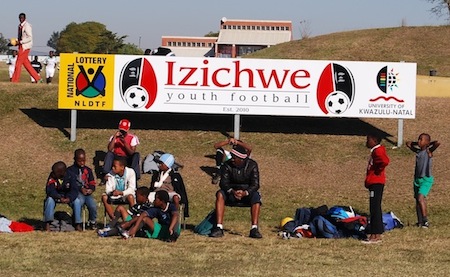
In the wake of Pitso Mosimane’s firing as Bafana Bafana head coach, there seems to be general agreement in South African football circles that a plan is needed to develop the local game constructively and sustainably.
On this blog, Mohlomi Maubane recently argued in favor of a German model that synchronizes the interests of the FA, the national team, and of professional clubs. “It is by virtue of young players being trained well that the German national team, and any other national team, can realise its full potential,” added Ted Dumitru and Sipho “King K” Kekana over at maximalfootball.com. “Lack of technical education in this vital aspect made many nations, including SA, compete without an identity and the results have been disastrous,” the two experts point out.
On June 9-10, 2012, the national finals of the under 15 boys’ Manchester United Premier Cup provided some clues about what lies ahead for South African football. At the Nike Football Training Centre in Klipspruit, Soweto, Ajax defeated SuperSport United in the final (2-1) to qualify for the global finals in China in July. The rest of the field featured Orlando Pirates, Izichwe FC, Bidvest Wits, School of Excellence, Diambars, and Mamelodi Sundowns.
According to observers’ accounts, most teams at the Premier Cup fielded sides of tall, strong boys indulging in well-rehearsed kick-and-rush football. Two exceptions stood out: Izichwe FC and School of Excellence. The case of Izichwe, an extraordinary program based at the University of KwaZulu-Natal in Pietermaritzburg, illustrates how making highly technical footballers out of promising teenagers requires not only financial resources and qualified coaches, but also time and patience.
Izichwe distinguishes itself in a number of ways from the vast majority of youth programs in South Africa and elsewhere on the continent. Founded in 2010, when my family had the privilege of being welcomed into the Izichwe clan, the academy got its name from the regiment (ibutho) of Shaka kaSenzangakhona, the founder of the Zulu kingdom. It operates on a shoestring budget compared to the PSL youth teams in the Premier Cup. It is a not-for-profit organization in which the parents and sponsors — both local and international — actively participate in shaping the sporting and educational development of each youngster.
After intense daily training sessions, the Izichwe boys, many of whom come from humble backgrounds, remain on the University of KwaZulu-Natal campus for a meal and to complete their homework before returning home for the night. Developing responsible citizens is considered just as important as training future members of Bafana Bafana. From a football standpoint, Thabo Dladla, Izichwe’s technical director, points out that while Izichwe coaches understand the importance of the team their priority is individual development. The coaching staff works assiduously to develop the technical, tactical, psychological, physical and emotional aspects of the boys’ game. Another important aspect of the Izichwe approach is the lack of an overbearing, ambitious owner, the kind of person who regularly exerts pressure on coaches and players to deliver trophies and obey the dictatorship of results.
For Bafana Bafana to improve, the quality of play in the Premier Soccer League — the richest league in Africa — must improve; but this cannot happen if football development programs fail to provide players under the age of 16 with the multiple skills required for successful professional careers. Izichwe shows the way forward. As we say in isiZulu: “Phambili!”.
2010 was the year of Africa’s first World Cup, a historic year for South Africa and for the continent. An hour west of Durban’s huge Moses Mabhida Stadium, in the KwaZulu-Natal hills, every weekday afternoon 46 boys train on a modest football ground at the University of KwaZulu-Natal in Pietermaritzburg. These 13-year olds symbolize the immense potential of grassroots football in South Africa.
In an atmosphere of quiet industriousness and positive support, the boys of the Izichwe Youth Football programme go through fitness routines, refine individual skills, and play small-sided games under the watchful eye of several local coaches.
Named after the regiment commanded by Shaka Zulu two centuries ago, Izichwe is a not-for-profit development program providing access to high-level football training and life skills instruction to black youth from the Pietermaritzburg area. Working on a shoestring budget, it helps to overcome enduring barriers to participation in sport for black youth in a democratic South Africa.
It has been an honor and a privilege for me to be part of Izichwe while a Fulbright Scholar at the University of KwaZulu-Natal. I am grateful to Thabo Dladla, Izichwe’s founding director, for warmly welcoming my family into this wonderful sporting community. One of my daughters joined Izichwe–the only girl and the youngest player by three years.
As our involvement with the program intensified, I realized that I had come full circle from my first visit to South Africa in 1993 as a young volunteer sports coach in Khayelitsha, a massive black township on the outskirts of Cape Town. Now I was here with my entire family and I got to rekindle and sharpen my coaching inclinations. I also gave occasional classroom lectures to the youngsters, prepared them for an oral history project, and helped with the year-end function (see video above).
There is something very special about Izichwe. Thabo Dladla, Mhlanga Madondo, “Styles” Mkhize, Patrick “Cutter” Mthembu, Xolani Madlala, Ronnie Chetty and Kristen Konkol provide specialized coaching and caring, constructive leadership. Their positive, non-authoritarian approach aims at unleashing the boys’ potential on and off the football pitch.
Izichwe’s approach is not so much about winning games and tournaments, but about teaching technical, tactical, psychological and physical skills that will serve the teenagers well down the road. This long-term vision of achievement can be tough on the boys. I have seen them lose against teams stacked with over-age players. A few years down the road it will be interesting to compare the achievements of the Izichwe boys with those of the over-age players.
To understand Izichwe is to appreciate how football is closely linked to the physical, intellectual and social growth and development of historically disadvantaged South African youth. Most players come from tough socio-economic circumstances and at Izichwe they learn sport’s values of teamwork, hard work, discipline, and achievement. The daily training routines provide needed structure to these student-athletes’ lives. In many cases, I have seen individuals acquire confidence, strengthen their self-esteem and self-awareness, and even improve their academic performance.
Next year I hope that a girls’ team will be up and running at Izichwe. It is important that the same opportunities offered to boys are also made available to girls. I am confident that a few years from now, many Izichwe veterans—male and female—will be representing their country and competing in top leagues. For those individuals who will opt for a career in something other than football, Izichwe will have empowered them with skills, knowledge and experience to become good citizens and community builders.
As I prepare to leave South Africa in a few days, I want to take this opportunity to thank my fellow coaches and the players at Izichwe. Their warmth, generosity and brotherhood will never be forgotten. This moving experience has reminded me of a German theologian’s response to a question about how to explain happiness to a child: “I wouldn’t explain it,” Dorothee Solle said; “I’d toss him a ball and let him play.”